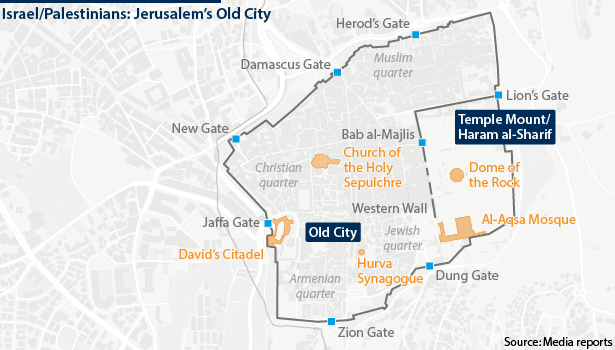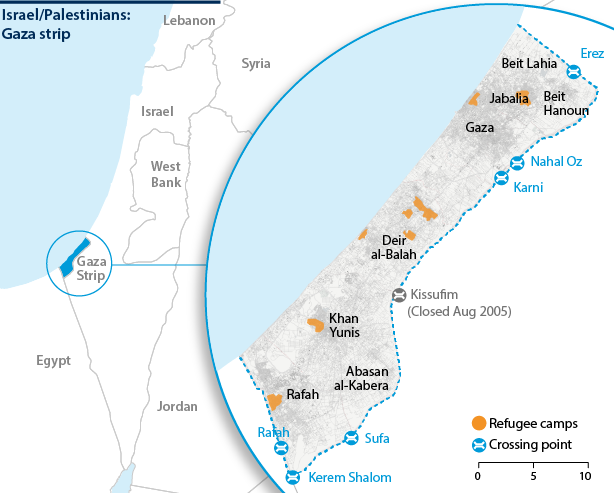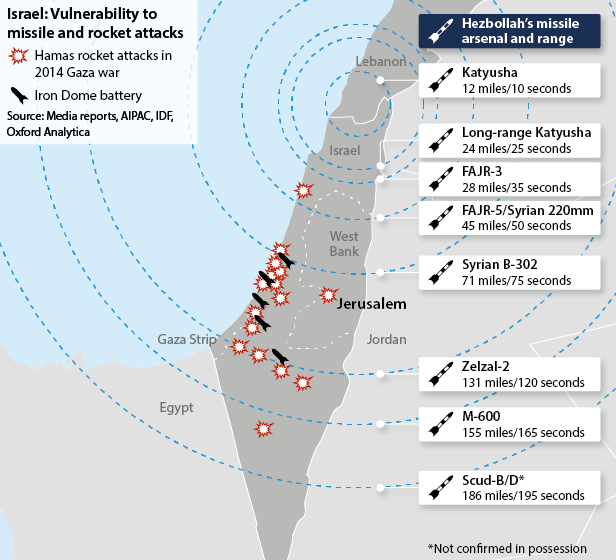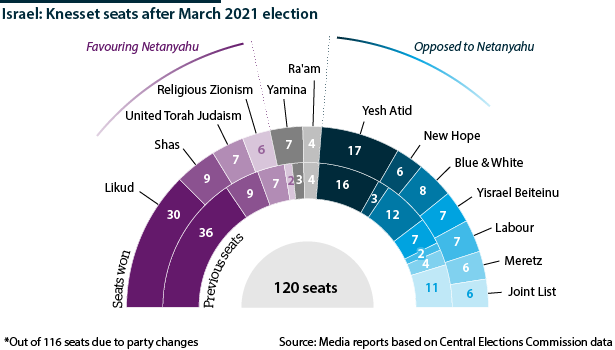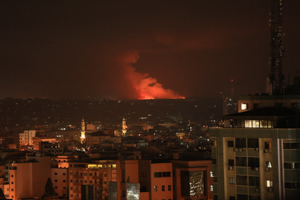Blazing Israeli-Palestinian conflict may burn out
A dispute at the Al-Aqsa mosque has ignited wider fury over multiple provocations
Israel’s defence minister today mobilised reserve troops, after rising tensions in Jerusalem initiated an ongoing military exchange with Hamas in Gaza. The latest outbreak of violence follows a gradual rise in localised tensions during the Muslim holy month of Ramadan, mostly centred in Jerusalem. However, it also reflects high-level political shifts over the same period on both the Israeli and Palestinian sides, as well as the changed international environment under the new US administration.
What next
Israel’s retaliation against Gaza is set to intensify in the coming days, hurting Hamas but stopping short of the level of destruction seen in 2014. Palestinian and Arab Israeli anger will drive further protests and riots, although tight security control structures and external pressure from all sides mean this is ultimately likely to die down rather than develop into a sustained insurrection.
Subsidiary Impacts
- Israel’s Supreme Court will seek to avoid ruling on the constitutionality of the Absentee Assets Law, key to Jerusalem land disputes.
- US President Joe Biden will face pressure from the Democratic party’s left wing to strengthen criticism of Israeli policies.
- Israel’s Likud party will try to split rival factions by raising controversial issues such as West Bank settlement legalisation.
Analysis
The conflict began to simmer in mid-April, with the first clashes at the Al-Aqsa Mosque on the Temple Mount/Haram al-Sharif. Israeli police cut power to loudspeakers issuing the Muslim call to prayer at the beginning of Ramadan, because Jews were commemorating fallen soldiers on Memorial Day at the nearby Western Wall site, and also partially blocked access for Arab worshippers. Although this decision was later reversed, tensions have since been high around the mosque.
Mounting provocations
On April 29, the Palestinian Authority (PA) controlling the West Bank cancelled the first planned legislative elections for 15 years, scheduled for May 22. It cited an alleged Israeli refusal to allow Palestinians living in East Jerusalem to vote, although the main driver seems to have been a fear that divisions within the ruling Fatah party would hand victory to Hamas, the Islamist political-military movement controlling the Gaza Strip.
The situation deteriorated further in early May, with the threatened eviction of some Palestinian families living in the Arab-dominated Sheikh Jarrah neighbourhood of East Jerusalem, where settler organisations have long claimed land that was Jewish-owned before 1948. Consequent riots and demonstrations coincided with wider clashes and revenge attacks across the West Bank.
Religious and national celebrations clashed this year
An increase in violence was always likely towards the end of Ramadan, with multiple sources of provocation coinciding yesterday, including:
- a right-wing Israeli march commemorating the 'reunification' of the city on Jerusalem Day, due to pass through Arab neighbourhoods; and
- a Supreme Court ruling on the Sheikh Jarrah case.
Both were cancelled at the last minute, but by that time Arab anger had mounted. At the same time, Israeli police used stun grenades and tear gas inside Al-Aqsa itself to confront angry Palestinians wielding stones and other makeshift weapons. This caused anger and public protest across the Muslim world.
Gaza escalation
The sudden intervention of Hamas moved the crisis to a new level. The Islamist movement had launched a few rockets and incendiary balloons, confirming the Israeli security establishment's assumption that it would choose restraint. However, Hamas subsequently issued an ultimatum for Israel to withdraw its police from Al-Aqsa and Sheikh Jarrah by 6pm yesterday, and to free detainees.
Immediately the deadline passed, Hamas fired six rockets, including some targeting Jerusalem for the first time since 2014. The Knesset (parliament) was forced to evacuate.
Israel responded with air strikes, overnight and into today, as many more rockets came from Gaza, mostly now focused on southern Israel. Dozens of Palestinians have been reported killed, including children, with over 100 injured; dozens of Israelis have also suffered injuries and one has been killed.
Palestinian protests continued in Jerusalem and the West Bank. Arab Israeli citizens also launched demonstrations in solidarity last night, some of which became violent: during one riot in the town of Lod, an Arab man was fatally shot by a Jewish resident.
Israeli coalitions
Reflecting this anger, Arab Israeli politician Mansour Abbas suspended his involvement in negotiations to take part in a new Israeli coalition government. Prime Minister Binyamin Netanyahu failed to gain sufficient support to form a new administration following March 23 polls. On May 5, centrist leader Yair Lapid received the mandate to negotiate a complex coalition involving Israeli Arab and leftist parties plus strongly nationalist right-wingers such as Naftali Bennett (see ISRAEL: A fragile cross-spectrum government may emerge - May 7, 2021).
Success depends on avoiding ideological disputes; the crisis has brought the most sensitive one to the fore.
The Gaza escalation might just reprieve Netanyahu
Netanyahu, as caretaker prime minister, thus has a strong incentive to exacerbate the crisis, hindering the formation of a rival government and burnishing his security credentials ahead of new elections. Defence Minister Benny Gantz, part of the potential rival coalition, has some scope to constrain his decisions -- but in fact the desire to establish a powerful deterrent exists across the Israeli political scene.
The military therefore seems to be gearing up for intensified Gaza operations.
Palestinian incentives
On the Palestinian side, public anger and frustration has long been mounting, as Israeli settlement-building and security constraints progressively undermine any chance of a political future (see PALESTINIANS: US rapprochement will hit a dead end - February 2, 2021). The experience of a pandemic without significant economic aid and with no quick prospect of a return to normality through vaccination has intensified the sense of hopelessness, and the failed elections only underlined the impossibility of political change.
Hamas's move capitalised on such anger, which has long lacked an outlet. The group is using the cancelled election to undermine Fatah, both in the Palestinian context and by riding the wave of Arab and Muslim global outrage over Al-Aqsa.
However, the group is also paying a heavy military price, expending part of its store of rockets to little substantive effect, while losing multiple launch sites and military installations. Israeli is also targeting senior Hamas commanders personally, using drones.
Continued Israeli retaliation could result in more civilian casualties and infrastructure losses, further undermining the already-desperate living conditions in Gaza -- for which the population may ultimately hold Hamas accountable. Key external powers Egypt and Qatar, which provide an outlet to the wider world and financial aid, respectively, are also pushing for de-escalation.
Outlook
All external powers favour de-escalation. None has an interest in the Palestinian issue blowing up without a clear endgame. Both Washington and Tehran are focused on negotiating a return to the 2015 Iran nuclear deal and want no distraction.
The world -- and most particularly, the PA -- is therefore counting on longstanding political dynamics, which have prevented any change, to restore the status quo. Hamas has made Fatah look irrelevant once again, but it has no scope itself to take power in the West Bank. Israel wants to make a point, but it has no interest in repeating the widespread destruction and thousands of casualties of the 2014 Gaza war, which ultimately solved nothing.
The lack of external support, combined with Israeli-enabled Fatah security control, will therefore likely block a third sustained mass Palestinian intifada (uprising).
